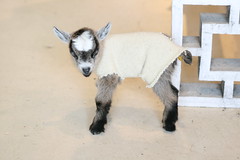How to Raise Goats – 3 Tips To Help You Start A Goat Farm Successfully In This Profitable Market

Image by Jin Aili
goats – the pens are for the "zero-grazing" method of raising goats, to avoid environmental degradation
Article by Ted Allen
Keeping goats for a profit is now acquiring more and more patrons. For one thing, the market is still expanding. Demand for goat milk based products (e.g. goat cheese, ice cream, yogurt, etc.) are also on the rise. A good number of consumers are now favoring naturally lean goat meat in favor of pork and beef. The rich, soft fibers from these animals are likewise being rediscovered by the general public. Now, it is quite fashionable to own one or two pet goats in your home. So if you are interested to know how to raise goats, here are a few pointers.
1. Make sure that you have ample space in your home or farm where the goats can move about freely. When it comes to how to raise goats successfully, the animals’ shelter and pasture is one of the most important things to consider. Keeping the goats in tightly enclosed pens would only result to very destructive and unproductive animals. At the same time, allowing the hoofed creatures to freely roam just about anywhere is like ringing the dinner bell for likely predators.
What you would need is an enclosed space with separate pens lined with dry hay for bedding. This is essential for the goats’ shelter especially at night and during extreme weathers. A high fenced pasture would ensure that the animals stay on your lot and get their exercise too; but the enclosure should be sturdy enough to keep predators out as well.
2. Another important factor when learning how to rear goats is choosing the right breed of goats. You should decide early on as to what kind of “product” you want to eventually market. Will you be raising goats for their meat, milk or coat? Would you rather raise pet goats instead? You should answer these questions first before you buy the animals from suppliers.
3. Another basic thing you should remember when it comes to how to raise goats successfully is that you would need to regularly hire the services of a qualified vet when you start your farm. Although you can do without the animal doctor’s help, investing on the professional’s advises and recommendations would make your herd physically fit and less prone to fall into illnesses or contagious diseases. Having a vet on your payroll also ensures that the products you eventually market are of the highest grade. That, in turn means that you can choose the goats that carry the best genes, in case you decide to breed the animals for profit later on.

